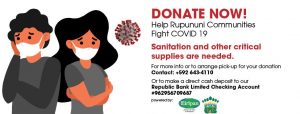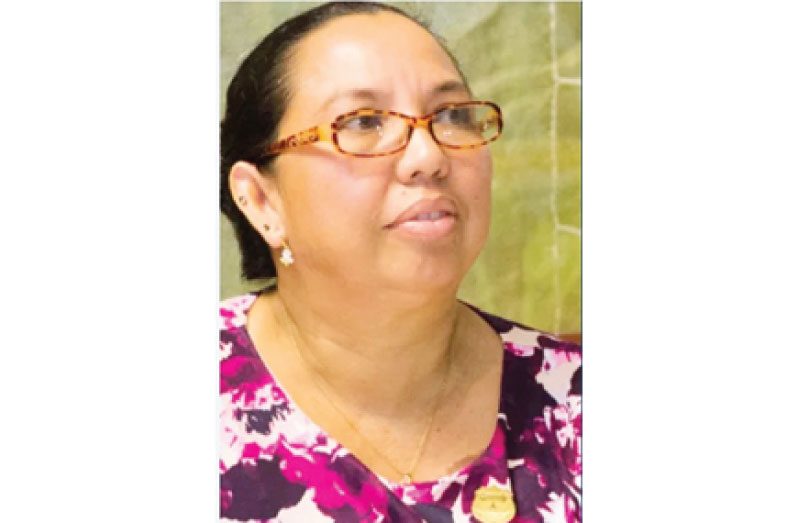By Lisa Hamilton
THREE Non-Governmental Organisations (NGOs) have teamed up to provide critically needed medical, sanitation and other supplies to indigenous communities across the Rupununi in Guyana as the spread of COVID-19 continues.
Face shields, sanitisers, spray bottles, thermometers, pain killers, gloves, reusable as well as surgical masks, fabric to make masks, paper towels, bleach and disinfectants, alcohol wipes and garbage bags are just some of the items identified as critical to residents in the Rupunini to fight the spread of the virus.
In an interview with the Guyana Chronicle on Monday, President of Eírîpan, Melanie McTurk, spoke about the GoFundMe page that has been launched aiming to reach US$25,000; how local donors can assist, and the need for such efforts.
Eírîpan, which took its name from the Macushi word meaning “to share”, has been in operation for over 15 years, promoting literacy, cultural preservation and personal participation in development in communities across the Rupununi. The Charity primarily supports children, and has already impacted over 1,000.
This year, it has liaised with the Kanuku Community Representatives Group (KMCRG), a community-based NGO which will assist with the delivery of the key items with help of various Village Councils. The purpose of the arrangement is so as to avoid the possible transfer of the virus from Georgetown to the Rupununi.
Also on board with the drive is the Rupununi Learners Foundation, a US-based non-profit organisation that supports a social enterprise approach to environmental conservation, encompassing wildlife research, education, economic development and cultural preservation.

McTurk pointed out that Indigenous communities around the world are considered the ethnic group most vulnerable to the coronavirus due to the lack of immunological exposure, which makes them more predisposed to the dire impact of the virus.
In terms of vulnerability, she said, Guyana is no different from any other country, as it also faces geographical challenges, whereby many communities are located far away from the capital where supplies and medical assistance are more readily available. Limited modes of transportation and seasonal flooding also add to the challenge in accessing medical support from the single regional hospital in Lethem, seat of administration in Region Nine (Upper Takutu-Upper Essequibo).
PROXIMITY TO BRAZIL
And while one may see the region’s distance from Georgetown, the capital, reputedly the epicentre of COVID-19, as a good thing, McTurk explained that many Indigenous communities are instead closer to neighbouring Brazil, which has the highest number of recorded COVID-19 cases and deaths in Latin America and the Caribbean (LAC). Brazil accounts for more than half of the region’s COVID-19 cases.
“We have a population that is accustomed to going across that border,” McTurk said, adding: “There are families that are split across that border, and it’s not that people are being reckless; it’s just that they don’t know any better, than the fact that they have always crossed this little river to be with their family.”
Furthermore, McTurk said that the NGOs have estimated that over 90 per cent of the population in the Rupununi are currently unemployed due to the pandemic, which has caused some businesses to close or layoff staff, and the halt in eco-tourism, which many communities depended on.
“That has been the case since March,” she said, “and this is why this is so critical. People and their villages have been building fences and gates; something that has never existed before, to lock down their communities. They have been setting up voluntary monitoring committees, monitoring the movement of people. Villages have gone to the effort to using village funds to buy bleach and soap to share in their communities, but, of course, none of us expected this to last so long, and communities just do not have the resources to keep going without help.”
Eírîpan and its partners hope to provide support to as many villages across the Rupununi as possible through their GoFundMe project. Meanwhile, local donors have already been contributing, so that those who wish to join in have the option to make direct deposits to the Republic Bank Limited Checking Account # 962956709687.
McTurk made it clear that the donations go straight towards the cause, and no form of salaries or payment is subtracted for those volunteering. “Every penny that we raise annually we use towards our projects in the Rupununi,” she said.
She also used the opportunity to commend frontline workers in the Rupununi who she said have been working tirelessly to attend to the sick, even during these challenging times. McTurk also commended the team of volunteers working to round up donations for the vulnerable in the Rupununi.



.jpg)










